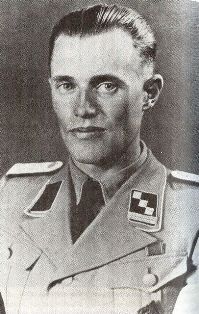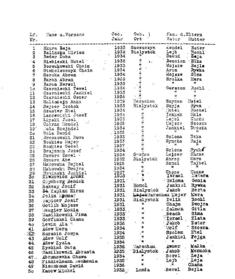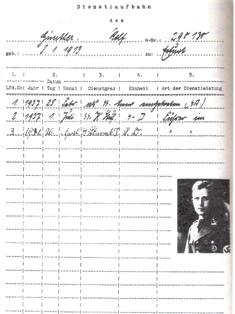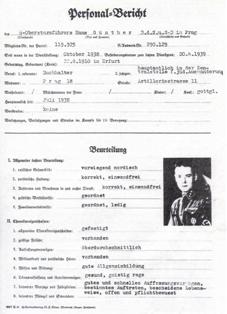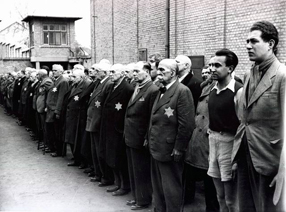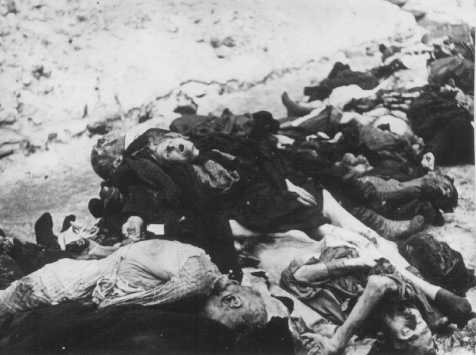Holocaust Education & Archive Research Team |
|
Trials Introduction to the Holocaust Trials
Trials
Interrogations & Testimonies
The IMT Series Nazi Justice
|
||||
Franz Nowak SS Station Master of Death
To the Competent Court of Justice, Vienna
Re: Request for Legal Assistance
The main hearing in the criminal proceedings against the Accused Adolf Eichmann is at present taking place in this Court. In the context of this main hearing, I request you to extend legal assistance to this Court by the examination on oath of the following witness:
SS Hauptsturmbannfuhrer Nowak, Remand Installation, Vienna
Relationship to the Accused or other persons involved in the examination: Not related. Section 153 of the Code of Criminal Procedure was explained to him.
Selected Extracts of Statement by Franz Nowak on the 15 June 1961
I remember transports of Jews taking place from Theresienstadt to Auschwitz. However, I no longer remember when this was and which authority issued the instructions for it. However, I assume that Section IVB4 received the relevant instructions from an authority to it.
I did not know that the persons in these transports were to be liquidated in Auschwitz. The transports were ordered in order to employ Jews for labour or to evacuate them.
I do not know whether Eichmann was able to issue orders independently, or whether he received orders for the transports. I do know that Eichmann was sent for by his superior almost every day. The reason why I know this is that often he was looked for and then it was said that he was with the Group Leader or the Department Chief.
Section IVB4 of the Head Office for Reich Security (RSHA) was responsible for the evacuation of Jews, Poles, Gypsies and Slovenes, and also had to provide transport when RSHA offices had to be transferred (particularly after air raids). The head of section IVB4 was Eichmann, who was in charge of several specialised employees. The official in charge of transport matters in Section IVB4 was the former SS Sturmbannfuhrer Rolf Guenther, to whom I was directly subordinate as an assistant Specialist Officer.
As an assistant Specialist Officer, I had to draw up the timetables for the specific train journeys and to organise the manner of reporting. For this purpose, I was provided by Guenther with the stations of departure and destination and the number of persons, and I then had to prepare the requisite documents for the Reichsbahn about the means of transport.
Guenther or Eichmann would then sign these documents. After the timetables were submitted for each specific train journey, I then had to prepare the reports to the Departments concerned.
As far as I know the RSHA was divided into departments, which were in turn divided into groups, and then the groups were split into sections. All I know is that Eichmann was the Section Head of Section 4 of Group B in Department IV (IVB4). I do not know anything about Eichmann heading a group or department in the RSHA.
I have no way of knowing whether Eichmann himself gave orders for deportations or only carried out orders. I can only say that the RSHA was organised along strict military lines, and everyone knew only what he had to know in order to carry out his duties.
I arrived in Vienna in May 1938 as an SS candidate to the Security Service and worked first in the Sports Section. In June or July 1938, I was attached to the Central Office for Jewish Emigration, where I made the acquaintance of Eichmann, the head of this office. However, already then, my immediate superior was Rolf Guenther.
Around summer 1939 I was transferred from the Central Office for Jewish Emigration in Vienna to the Central Office for Jewish Emigration in Prague. In Prague my immediate superior was Hans Guenther (a brother of Rolf Guenther). Eichmann came to Prague from time to time, and I believe that he was also the head of the Central Office for Jewish Emigration in Prague. In Vienna and Prague my duties were to receive applications for emigration.
Around the end of 1939 I went from the Central Office for Jewish Emigration in Prague to Berlin, to the section for the evacuation of Jews, Poles, Gypsies and Slovenes. The section head was Eichmann, and my immediate superior was Rolf Guenther.
My immediate superior was always Rolf Guenther, and from spring 1944 until roughly November 1944 in Budapest, SS- Hauptsturmfuhrer Wisliceny was my superior. However, in the period indicated, I was not in Budapest the entire time; for a while I was also in Berlin, and for a short time in Arad.
In Berlin, Rolf Guenther was always my superior, and in Arad Wisliceny was also my immediate superior. After Budapest I returned briefly to Berlin again, and then towards the end of 1944 was transferred to a course for bunker fighting, and then went to the Eastern Front with a unit of the Waffen – SS. This unit was under Fighting Commander von Konitz, a Colonel in the Army.
In Budapest the Eichmann Commando was subordinate to the Senior Commander of the Security Police and the Security Service in Budapest, SS – Standartenfuhrer Geschke. I never had any official title, and all the time I worked for the Head Office for Reich Security I was an assistant Specialist Officer for timetable and reporting matters.
IVB4 was not a department but a section in the RSHA, the department was in charge of the section. This section was the last link in the organisation of the RSHA. There were no sub-sections or sub-departments in a section, at least not in Section IVB4. The sections only employed Specialist Officers, but these had no authority to sign only the Section Heads had the authority to sign.
Within the Section, the fields of activity dealt with by the Specialist Officers were designated a, b, c etc. As far as I remember Section IVB4 had three or four Specialist Officers, depending on the work load. Field “a” was transport.
The Specialist Officers here were my immediate superiors, as I have already indicated. In Budapest, however, instead of the term IVB4, there was the Eichmann Commando, but its field of activity was the same as in IVB4.
As far as I am aware, however, there was a basic difference between IVB4 and the Eichmann Commando, i.e. that the Eichmann Commando was not organisationally speaking, part of the RSHA, but was subordinate to the Senior Commander of the Security Services in Budapest.
While I was working in the RSHA, I had dealings only with the Reich Transport Ministry and the Reich Railways Eastern Management, in Budapest I dealt only with the Budapest Transport Headquarters.
I had no dealings at all with agencies of the Generalgouvernement and of the Reich Commissariat of the Eastern Occupied Territories; I do not know Sturmbannfuhrer Hoefle. I had nothing to do with the Commander of the Security Police in Lublin. I do not know Huppenkothen and Worthoff.
Muller was the Department Chief of Department IV in the RSHA, but I had nothing to do with him. I know the name Stahlecker, but I had no official relationship with him. The only thing I know is that in 1938 Rolf Guenther was the Inspector of Security Police and the Security Service in Vienna.
I know Otto Hunsche; he was for a short time a Specialist Officer in Section IVB4 and was also a member of the Eichmann Commando in Budapest. I had no official links with Hunsche and also do not know for which field he was the Specialist Officer.
I did go to Budapest in May 1944 to take part in the timetable conference in Vienna. However, I no longer remember whether I received this assignment from Eichmann or from Wisliceny. An official from the Reich Railways was in the chair, and there was a discussion in general terms of timetables for future movements, including those of the army. My assignment was to receive the timetables for special trains for evacuating Jews from Hungary.
I do know by name a Hungarian gendarmerie captain called Kullay or Lullay, but I had no official dealings with him. This captain also took part in the Vienna timetable conference and I frequently saw him at the Eichmann Commando office in Budapest.
As far as I can remember, it must have been around the end of July 1944 when the transports of Jews from Hungary were stopped. However, I do not know which authority ordered this halt. I did not discuss the halt of transports with Eichmann, nor did I receive any instructions from him on the matter.
After transports were halted, I returned to Section IVB4 in Berlin for a few weeks and left with the Eichmann Commando for Rumania. I do not know what was the purpose of the transfer to Rumania. In Arad we evacuated German Field Hospital and helped with the repatriation of the ethnic Germans.
As a result of military events, the Eichmann Commando withdrew together with the fighting forces. At the time of the Arrow Cross revolt in Hungary – around autumn 1944, I was again temporarily in Berlin and then had to return to Budapest.
After that, until the Eichmann Commando was dissolved, around the end of November, transports of Jews to Vienna were carried out, and those included in the transports were to be used as labourers in building the Ostwall.
I did not receive from anybody an order to deport Jews from the Kistarcsa assembly camp, nor do I know anything about such deportation. I do not know the Kistarcsa location, nor have I ever been there, although in the proceedings pending against me in the Vienna District Court for Criminal Cases a witness alleges to have seen me at the Kistarcsa assembly camp.
Before taking up my duties in Budapest, I received a written movement order to report to Mauthausen. It may have been that this was on 19 March 1944. I did not know for what purpose I was to report to Mauthausen.
It was only later that I found out that all Security Police and Security Service personnel operating in Hungary received such orders. I saw Eichmann as well in Mauthausen.
I do not know whether Rolf Guenther was superior to Eichmann at the time. I have already mentioned that I do not know whether Eichmann headed Section IVB4 during his tour of duty in Budapest. If this was not the case, then it was quite possible that, as Deputy Head of Section IVB4, Rolf Guenther was able to issue instructions to Eichmann through the Senior Commander of the Security Police and the Security Service in Budapest.
Sources:
Eichmann –His Life and Crimes by David Cesarini published by W. Heinemann 2004 Transcripts of the Eichmann Trial Holocaust Historical Society Israel Government Press Office Yad Vashem
Copyright Graham Marriot H.E.A.R.T 2010
|
